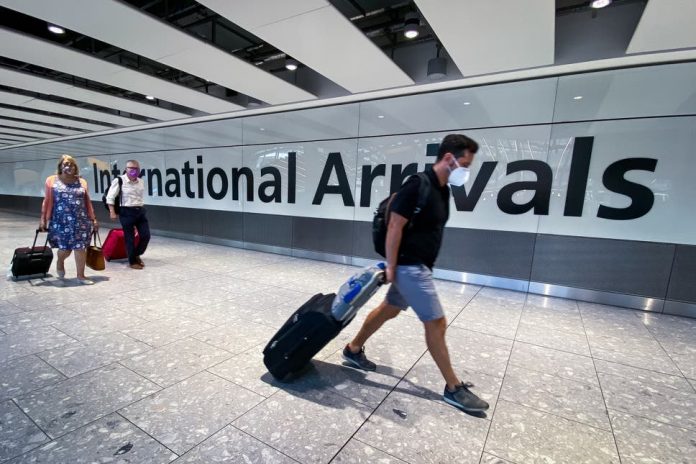The travel industry was dealt a hammer blow on Thursday as Portugal, the only mainstream holiday country on the green list, was downgraded to amber.
Transport secretary Grant Shapps cited fears over “a mutation of the Delta variant”, the virus mutation wreaking havoc in India, for plunging Portugal into the amber category, joining most of Europe. The mutation is linked to Nepal.
Can I travel to amber and red list countries? UK travel rules explained
The decision was made by the government after an “almost doubling” in the country’s coronavirus positive test rate and the discovery of 68 cases of the Indian variant, including some with a mutation previously seen in Nepal.
Holidaymakers in the Atlantic nation now face a scramble home before the 8 June deadline.
No other countries joined the green list, while seven were added to the red list.
One slim ray of hope came from France, which announced today that, from 9 June, fully vaccinated British holidaymakers will be allowed to enter the country, with no requirement to quarantine. However, France remains on Britain’s amber list, necessitating a 10-day quarantine and two PCR tests for all inbound travellers to the UK.
– Employers risk discrimination claims without post-holiday quarantine policy
Employers risk discrimination claims without a post-holiday quarantine policy in place, a lawyer has said.
The abrupt removal of Portugal from the UK’s travel green list will put many holidaymakers and their employers in a difficult position. Those returning after 4am on 8 June will be forced to self-isolate for 10 days, where previously they expected to be quarantine-free.
Suzanne Staunton, Employment Partner at JMW Solicitors, says: “Employers should make it crystal clear to their employees that they must quarantine, no matter what the impact will be on the business. Employees working from home can simply continue to work from home during their 10-day quarantine. Those employers that usually require their employees to attend their place of work have a number of options regarding how to treat the quarantine period: they can ask their employees to take paid holiday; take another form of paid leave; or take that time off as unpaid leave.
“Going forward, in light of what has happened with Portugal, employers may wish to have a policy which deals specifically with the way that quarantine time will be treated.”
She added that, when an employee returns, it is important for employers to have an “honest and open dialogue concerning the way that quarantine time will be treated”, and to take individual circumstances into account which “might otherwise result in claims for discrimination if not handled appropriately”.
– Brits who are fully vaccinated against Covid can enter France from next week
Brits who are fully vaccinated against coronavirus can enter France without needing an “essential reason” from next week.
The border will open on 9 June for those who can provide proof of having received both jabs. However, British visitors will still need to provide a negative Covid test.
A new document released in Paris on Friday called ‘Strategy for Reopening Borders’ outlines plans for what is effectively a vaccine passport.
Documents issued by organisations including Britain’s NHS which prove a double vaccination against coronavirus will be sufficient to get into France.
“Europeans vaccinated against Covid-19 will be able to enter France without a PCR test from 9 June, which proof of a negative test – PCR or antigen – will still be required for travellers from the United Kingdom and the United States,” said a French government source.
“Those who have had a full vaccination for at least14 days on the date of travel (and four weeks for the Johnson & Johnson vaccine) are considered to be vaccinated.”
Unvaccinated travellers from the UK must still have a “compelling reason” to enter and must self-isolate for seven days.
France remains on the UK’s amber list, which means arrivals to Britain from there are required to self-isolate for 10 days and pay for two PCR tests.







